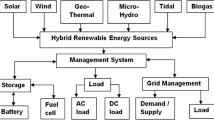Abstract
Given the renewable sources complementarity, hybrid renewable energy systems (HRES) have been mostly used to address the limitations of single renewable source in terms of stability and reliability. In this regards many researches have been conducted to improve the hybrid efficiency. The aim of this work is to perform a comparative study of HRES architectures based on a qualitative investigation of the power converters efficiency used in each topology. Numerical application is performed based on technical features of converters in order to distinguish the best HRES configuration.
Access this chapter
Tax calculation will be finalised at checkout
Purchases are for personal use only
Similar content being viewed by others
References
RENEWABLES 2019: global status report. www.ren21.net
Berringer K, Marvin J, Perruchoud P (1995) Semiconductor power losses in AC inverters. In: IAS ’95. Conference Record of the 1995 IEEE Industry Applications Conference Thirtieth IAS Annual Meeting, Orlando, FL, USA, 1995, vol 1, pp 882–888. https://doi.org/10.1109/IAS.1995.530391
Zeb K et al (2018) A comprehensive review on inverter topologies and control strategies for grid connected photovoltaic system. Renew Sustain Energy Rev 94:1120–1141. https://doi.org/10.1016/j.rser.2018.06.053
Liu Q et al (2009) Solar and wind energy resources and prediction. J Renew Sustain Energy 1(4):043105. https://doi.org/10.1063/1.3168403
Wu TF, Chang CH, Lin LC, Yu GR, Chang YR (2013) DC-bus voltage control with a three-phase bidirectional inverter for dc distribution systems. IEEE Trans. Power Electron. 28(4):1890–1899. avr. 2013. https://doi.org/10.1109/TPEL.2012.2206057
Muselli M, Notton G, Poggi P, Louche A (2000) PV-hybrid power systems sizing incorporating battery storage: an analysis via simulation calculations. Renew Energy 20(1):1–7. https://doi.org/10.1016/S0960-1481(99)00094-4
Ashari M, Nayar CV (1999) An optimum dispatch strategy using sett points for a photovoltaic (PV)–diesel–battery hybrid power system. Solar Energy 66(1):1–9. https://doi.org/10.1016/S0038-092X(99)00016-X
Ahmed I, ElAmine SM, Saïd B, Youcef H (2017) Différentes Configurations du Système PV pour l’Alimentation Sans Interruption (ASI): Application au Relais GSM, p 10
Wichert B, Dymond M, Lawrance W, Friese T (2001) Development of a test facility for photovoltaic-diesel hybrid energy systems. Renew Energy 22(1–3):311–319. https://doi.org/10.1016/S0960-1481(00)00024-0
Elhadidy MA, Shaahid SM (1998) Feasibility of hybrid (WIND + SOLAR) power systems for DIIAHRAN, Saudi Arabia, p 7. https://doi.org/10.1016/S0960-1481(98)00344-9
Kaabeche A, Belhamel M, Ibtiouen R, Moussa S (2006) Optimisation d’un système hybride (éolien – photovoltaïque) totalement autonome. Revue des Energies Renouvelables 9(3):199–209
Ekren O, Ekren BY (2008) Size optimization of a PV/wind hybrid energy conversion system with battery storage using response surface methodology. Appl Energy 85(11):1086–1101. https://doi.org/10.1016/j.apenergy.2008.02.016
Mar B (1999) Hybrid solar-wind domestic power generating system: a case study. Renew Energy 17:355–358. https://doi.org/10.1016/S0960-1481(98)00123-2
Pires VF, Silva JFA (2002) Teaching nonlinear modeling, simulation, and control of electronic power converters using MATLAB/SIMULINK. IEEE Trans Educ 45(3):253–261. https://doi.org/10.1109/TE.2002.1024618
Douangsyla S, Indarack P, Kanthee A, Kando M, Kittiratsatcha S, Kinnares V (2004) Modeling for PWM voltage source converter controlled power transfer. In: IEEE International Symposium on Communications and Information Technology, 2004. ISCIT 2004, Sapporo, Japan, vol 2, pp 875–878. https://doi.org/10.1109/ISCIT.2004.1413844
Zhou S, Rincon-Mora GA (2006) A high efficiency, soft switching DC-DC converter with adaptive current-ripple control for portable applications. IEEE Trans Circuits Syst II 53(4):319–323. https://doi.org/10.1109/TCSII.2005.859572
Wu H, Sechilariu M, Locment F (2017) Influence of dynamic efficiency in the DC microgrid power balance. Energies 10(10):1563. https://doi.org/10.3390/en10101563
Chen Z, Boroyevich D, Burgos R, Wang F (2009) Characterization and modeling of 1.2 kv, 20 A SiC MOSFETs. In: 2009 IEEE Energy Conversion Congress and Exposition, San Jose, CA, Sept 2009, pp 1480–1487. https://doi.org/10.1109/ECCE.2009.5316106
Biela J, Schweizer M, Waffler S, Kolar JW (2011) SiC versus Si—evaluation of potentials for performance improvement of inverter and DC–DC converter systems by SiC power semiconductors. IEEE Trans Ind Electron 58(7): 2872–2882. https://doi.org/10.1109/TIE.2010.2072896
Wintrich A, Nicolai U, Tursky W, Reimann T (2015) Application manual power semiconductors, 2nd revised edition. ISLE Verlag, Ilmenau
Forest F et al (2006) Use of opposition method in the test of high-power electronic converters. IEEE Trans Ind Electron 53(2):530–541. https://doi.org/10.1109/TIE.2006.870711
Lopez M, Morales D, Vannier J-C, Sadarnac D (2007) Influence of power converter losses evaluation in the sizing of a hybrid renewable energy system. In: 2007 International Conference on Clean Electrical Power, Capri, Italy, May 2007, pp 249–254. https://doi.org/10.1109/ICCEP.2007.384218
Nanakos AC, Tatakis EC, Papanikolaou NP (2012) A weighted-efficiency-oriented design methodology of flyback inverter for AC photovoltaic modules. IEEE Trans Power Electron 27(7):3221–3233. https://doi.org/10.1109/TPEL.2011.2182211
Valentini M, Raducu A, Sera D, Teodorescu R (2008) PV inverter test setup for European efficiency, static and dynamic MPPT efficiency evaluation. In: 2008 11th international conference on optimization of electrical and electronic equipment, Brasov, Romania, May 2008, pp 433–438. https://doi.org/10.1109/OPTIM.2008.4602445
Bierhoff MH, Fuchs FW (2004) Semiconductor losses in voltage source and current source IGBT converters based on analytical derivation. In: 35th Annual IEEE power electronics specialists conference, p 7
Casanellas F (1994) Losses in PWM inverters using IGBTs, p 5. IEE Proc Electr Power Appl 141(5). https://doi.org/10.1049/ip-epa:19941349
Andersen RL, Lazzarin TB, Barbi I (2013) A 1-kW step-up/step-down switched-capacitor AC–AC converter. IEEE Trans Power Electron 28(7):3329–3340. https://doi.org/10.1109/TPEL.2012.2222674
Author information
Authors and Affiliations
Corresponding author
Editor information
Editors and Affiliations
Rights and permissions
Copyright information
© 2022 Springer Nature Singapore Pte Ltd.
About this paper
Cite this paper
Tyass, I., Bouamrane, O., Raihani, A., Mansouri, K., Khalili, T. (2022). Hybrid Renewable Energy System Investigation Based on Power Converters Losses. In: Bennani, S., Lakhrissi, Y., Khaissidi, G., Mansouri, A., Khamlichi, Y. (eds) WITS 2020. Lecture Notes in Electrical Engineering, vol 745. Springer, Singapore. https://doi.org/10.1007/978-981-33-6893-4_57
Download citation
DOI: https://doi.org/10.1007/978-981-33-6893-4_57
Published:
Publisher Name: Springer, Singapore
Print ISBN: 978-981-33-6892-7
Online ISBN: 978-981-33-6893-4
eBook Packages: EngineeringEngineering (R0)




